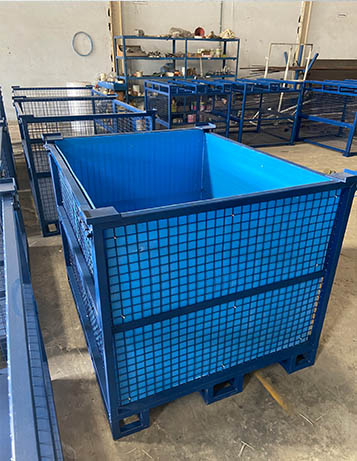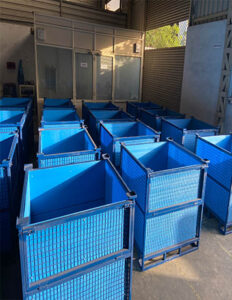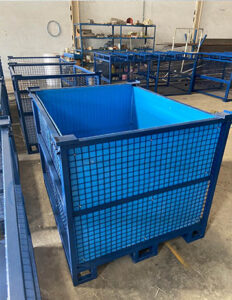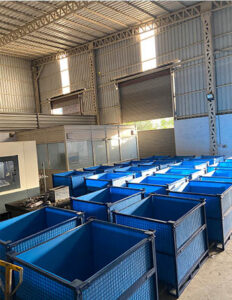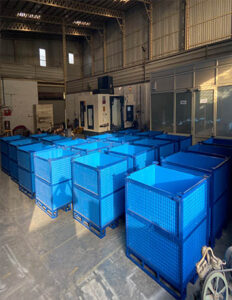Pallets
Industrial pallets are flat, rigid platforms used for storing, handling, and transporting goods in warehouses, factories, and during shipping. They are an essential part of logistics and supply chain operations. Here
Types of Industrial Pallets:
- Wooden Pallets: The most common type, made from wood, providing a sturdy and durable base for heavy items. They are widely used in a variety of industries and are cost-effective. However, they may need to be treated to prevent pest infestations.
- Plastic Pallets: Made from high-density polyethylene (HDPE) or polypropylene, plastic pallets are lightweight, durable, resistant to chemicals, and can be used for food and pharmaceutical industries. They are more expensive than wooden pallets but last longer and are easier to clean.
- Metal Pallets: Usually made from steel or aluminum, these pallets are extremely strong and ideal for heavy-duty applications. They are used for transporting very heavy items or hazardous materials.
- Corrugated Pallets: These are made from cardboard or corrugated paper, which makes them lightweight and eco-friendly. They are typically used for lighter, non-heavy items and for one-time use.
- Composite Pallets: Made from a combination of different materials such as wood, plastic, and metal, these pallets offer the benefits of each material and are often used in specialized environments.
Dimensions of Pallets:
- Standard Size (US): 48″ x 40″ (1219 mm x 1016 mm), commonly used in North America.
- EURO Pallet (Europe): 1200 mm x 800 mm (47.2″ x 31.5″).
- Other Sizes: Depending on the region or the application, there can be various sizes for different industries and types of transportation.
Uses of Industrial Pallets:
- Storage: Pallets help organize goods in warehouses, making it easier to move items via forklifts, pallet jacks, or other machinery.
- Transport: They serve as a foundation for products to be stacked and shipped across different locations. Most shipping companies and freight systems rely on standardized pallets for efficient transportation.
- Handling: Pallets facilitate the handling of heavy or bulk items, providing a safe and secure method to lift, move, and stack products.
Key Benefits of Using Industrial Pallets:
- Increased Efficiency: With pallets, goods can be moved more efficiently using forklifts, reducing manual labor and speeding up loading/unloading processes.
- Durability: Pallets are designed to withstand heavy loads and rough handling, ensuring the safe transport of goods.
- Standardization: The use of standardized sizes helps optimize warehouse space, and ensures compatibility with transport and storage systems globally.
- Stackability: Many pallets are designed to be stacked, saving space and maximizing storage capacity.
- Cost-Effective: While the upfront cost of pallets can vary (depending on the material), their long-lasting nature makes them an affordable option in the long term.
Pallet Maintenance and Recycling:
- Repairing: Wooden pallets can sometimes be repaired if they break or get damaged, while plastic and metal pallets can often be reused without much wear.
- Recycling: Old or damaged pallets can be recycled or repurposed, especially plastic and wood pallets, which are both biodegradable and recyclable.
Considerations:
- Weight Capacity: The load capacity of pallets depends on their material and design. It’s important to select a pallet that suits the weight of the items being transported.
- Environmental Impact: Wooden pallets can be treated to ensure they are pest-free, and plastic pallets are often recyclable. Composite and corrugated options are lighter and often more sustainable.

